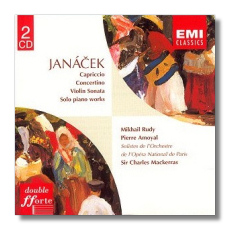
The Internet's Premier Classical Music Source
Related Links
- Janáček Reviews
- Latest Reviews
- More Reviews
-
By Composer
-
Collections
DVD & Blu-ray
Books
Concert Reviews
Articles/Interviews
Software
Audio
Search Amazon
Recommended Links
Site News
 CD Review
CD Review
Leoš Janáček

Chamber Music
- Conte for Cello & Piano
- Presto
- Sonata for Violin & Piano
- Capriccio for Piano and Seven Wind Instruments
- Concertino for Piano & Chamber Orchestra
Mikhail Rudy, piano
Pierre Amoyal, violin
Gary Hoffman, cello
L'Orchestre de l'Opera National de Paris/Charles Mackerras
EMI Classics 55585 2
I recently read a review of music by Janáček in which the writer opined that he didn't think Janáček was capable of writing uninteresting music. I would concur. Everything about his music inspires. Like Martinů, the music stimulates the frontal part of my brain and literally tickles it.
Last month I reviewed a set of Naxos recordings of Janáček's piano music. Those discs were one of the few diappointments in Naxos' efforts. At that time I mentioned that perhaps the problem was that comparison with Firkušný might be why I found them so plain. Listening to this disc, I can now say that Rudy is in the same class as Firkušný, but as his student. Everything about this playing delights, even when it is not delightful. If I have any reservations it is that Amoyal's playing is always beautiful, even when I would like a bit more acerbic tone.
What is Janáček's music like? In a general sense I have to say it will recall Dvořák but with a lot more angularity in the music. There is a neo-classical atmosphere to it but like Roussel more than Stravinksy. It is very stimulating. I think I figured out that this piece constitutes an operational definition of music which some critics have labeled, 'not very accessible'. I think we could understand this if we consider Tchaikovsky "accessible". That is, you can probably put Tchaikovsky's music on the player, do housework and still develop some sense of appreciation. If you don't actually sit down and "listen" to Janáček you will not appreciate him nearly as much . The same is true of Martinů and Roussel.
The first piece is fascinating. The cello here for some reason reminds me of Strauss' Don Quixtoe. In fact, there is a story to it. The excellent insert notes are helpful here and in developing a feel for everything on this disc. (Here the RCA Firkušný disc, which contains the last two items on this one, is miserable. The insert notes provide a thumbnail sketch of Firkušný and say nothing about the music.) The opening has a cello pizzacatto answering and singing to a piano. This melody lingers in my mind's ear, I find myself humming it. The second movement of this Conte is a flirtation between the lovers. I could go on about the other movements, but that would be cribbing too much from Pierre Vidal's notes. I can say that hearing this music was a revelation.
The next piece opens not unlike a Brahms Sonata for violin and piano. Amoyal's playing is fabulous. The adagio, last movement opens with him playing like some mosquito haunting the background. The piano and violin engage in a duet that is almost operatic in its richness.
The last two pieces on this disc are the only ones on the comparable RCA Firkušný disc. Here the slight edge has to go to Firkušný. I want to emphasize the modifier 'slight'. In Rudy we are hearing someone who must love this music. I hear in his interpretation a more neo-classical ambience than with Firkušný. Firkušný's playing, on the other hand, reminds me that he knew Janáček personally and that the music was a living thing to Firkušný. His left hand, in particular, seems to find nuances and magic just beyond Rudy's touch. I do not want to make too much of this, however, because you really should hear this disc.
Whilst listening to this disc one day, while the wife and kids were out, Susan and the twins returned. As she came in the door, Susan said (not asked) "Is this the kind of stuff you listen to when I'm not home?" She then requested I turn it off, which I did. As soon as I could, however, I put the headphones on and enjoyed this disc immensely.
Copyright © 1997, Robert Stumpf II


















